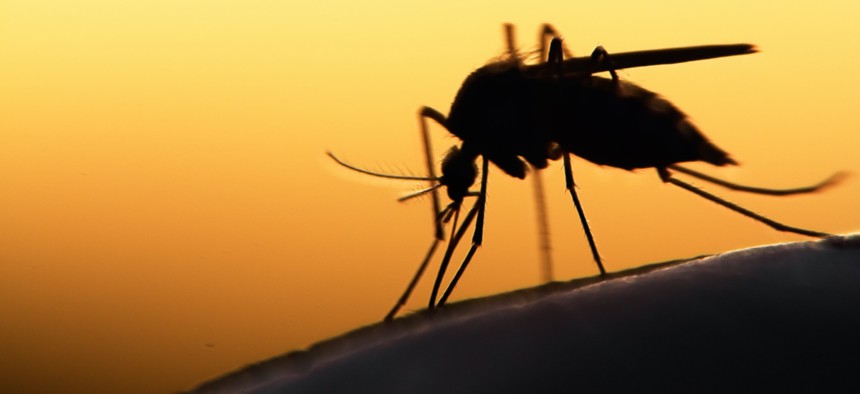Michigan Residents Urged to Stay Indoors to Avoid Deadly Mosquito-Borne Illness

A quarter of EEE cases nationwide last year were in Michigan, according to the CDC. Shutterstock

Connecting state and local government leaders
Eastern Equine Encephalitis has been confirmed in 22 horses and is suspected in at least one human in Michigan. The disease, transmitted by mosquito bite, kills a third of people it sickens.
Officials in Michigan are urging residents in some counties to stay inside after dusk to avoid mosquitoes after a dangerous mosquito-borne illness was confirmed in 22 horses and suspected in at least one human.
The Michigan Department of Health recommended that officials in 10 affected counties cancel evening and nighttime events and said it would also conduct aerial mosquito control treatment in “certain high-risk areas” of the state to help curtail Eastern Equine Encephalitis (EEE), which is spread through the bite of an infected mosquito. As of Friday, there were double the number of animal cases in the state as the same time last year.
“These additional cases of EEE in horses underscores the importance of providing aerial treatment in the affected counties,” Dr. Joneigh Khaldun, chief medical executive and chief deputy for health at the state Department of Health and Human Services, said in a statement. “There is an ongoing threat to the health and safety of Michiganders as we know mosquitoes are carrying this potentially deadly disease in these areas. Last year, 10 families were devastated by this disease and we are trying to protect others from being infected.”
EEE is a rare virus that causes brain infections and kills roughly one-third of people it sickens and leaves many others with lifelong neurologic problems, according to the Centers for Disease Control and Prevention. People can become infected after a single bite from a mosquito carrying the virus, though some will have mild symptoms or none at all. People younger than 15 and older than 50 are most at risk for severe illness.
Thirty-eight people had the virus last year nationwide, more than in any previous year since the CDC began tracking it. More than a quarter of those were from Michigan. A typical year sees 11 cases, according to federal data.
As of Sept. 9, five human cases had been reported to the CDC—three in Massachusetts and two in Wisconsin. Officials in Michigan said they were awaiting final results from lab tests to confirm EEE in a resident of Barry County, but preliminary tests indicated the patient was infected. Symptoms include the sudden onset of fever, chills, body and joint aches, which can progress to severe encephalitis, resulting in headache, disorientation, tremors, seizure and paralysis.
Horses can be vaccinated for the disease, but there is no vaccine—or specific treatment—for humans. Avoiding mosquito bites is the only way to prevent EEE, and health professionals recommend that people in high-risk areas wear insect repellent and stay indoors after dark and in the evening, when mosquitoes are most active.
Kate Elizabeth Queram is a staff correspondent for Route Fifty and is based in Washington, D.C.

NEXT STORY: Tennessee Using Federal Coronavirus Funds for Police Training




